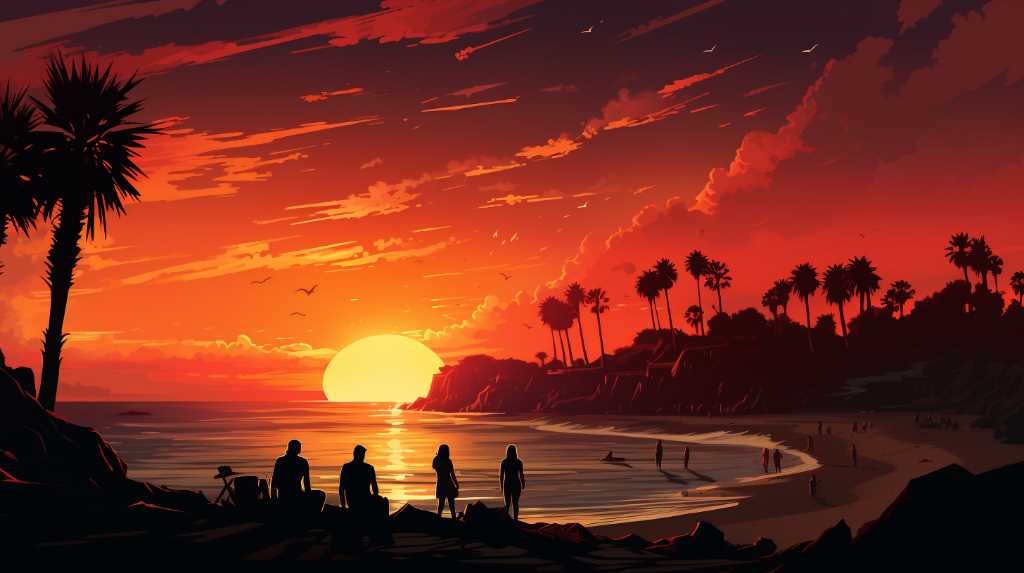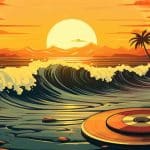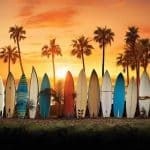
California has its own surf talk that comes from its surfing tradition. This special way of talking helps surfers talk about waves and moves clearly and also makes them feel like part of a group.
We’re going to look at this surf talk and see how it helps surfers share their highs and lows. If you want to understand surfers or fit in with them, you need to know this slang.
We’ll look at where some popular surf terms came from and how they’re used beyond the beach, keeping in mind how they fit into surfer behavior and rules.
The Basics of Surf Speak
Exploring surf speak shows that surfers have their own special way of talking. This language is very important to surfers in California because it helps them feel like they belong to a group.
For example, when they say ‘gnarly,’ they mean something that is really amazing or tough in surfing. ‘Hang ten’ means doing a cool move where a surfer stands at the end of the board and all ten toes are hanging over the front.
These words are not just cool to say; they connect today’s surfers with the sport’s history that started in Polynesia and grew in California. When surfers use these words, they are showing respect for surfing’s past and the close-knit surfing community.
This way of speaking isn’t just random; it shows the deep cultural meaning behind the sport.
Surfing the Waves: Terminology
Surfing has its own special words that help surfers talk about and understand their sport better. Let’s dive into some of these words to get a better idea of what they mean.
The term ‘barrel’ is used when a wave forms a hollow space as it breaks, and surfers try to get inside this tube-like section.
‘Cutback’ is a move surfers make to turn back towards the breaking part of the wave, which helps them stay close to where the wave has the most energy.
People who study how language works in different social groups might look at these words to see how surfers communicate with each other.
Knowing these words is very important because it helps surfers talk to each other clearly and shares the special bond between the surfer, their board, and the ocean.
Dude, What’s a Kook?
In California’s surfing world, ‘kook’ is a word used to call out a newbie surfer who doesn’t really get the rules or how to surf well. It’s not just about not being good at surfing, but also about not acting right around other surfers.
For instance, a kook might rudely take someone else’s wave, not know who should go first, or act like they’re way better than they actually are. When someone uses the word ‘kook,’ they’re saying that person isn’t following the unspoken rules that surfers follow. Although it’s a bit mean, calling someone a kook is also a way of teaching them how to fit in with the surfing crowd.
To avoid being a kook, you should watch and learn from experienced surfers. Don’t try to show off if you can’t back it up. And most importantly, be respectful in the water – wait your turn and don’t steal waves. Just like any other community, surfers have their own way of doing things, and it’s important to learn and follow these rules if you want to be accepted.
Interpreting Beach Banter
Learning what ‘kook’ means is a good starting point for understanding how surfers in California talk to each other. They use special words that only they know, which helps them recognize who is part of their group and teaches new surfers about the culture. Instead of just saying they did a difficult move on their surfboards, they’ll use short, vivid phrases like ‘shooting the curl’ or ‘hanging ten’ that pack a lot of meaning.
When we look at these words, we can see there’s a sort of ranking among surfers and how much they respect the sea. They use this language to share what they see in the waves, to keep each other safe, and to show whether they’re friends or competitors. This strengthens how they see themselves as surfers and shows what’s important in their world.
For example, when someone manages to balance on the front of their board, they might say they’re ‘hanging ten,’ which means they’re doing something really skilled. And if you’re new and making mistakes, they might call you a ‘kook,’ but it also shows that there’s room to learn and become part of the community.
Talking this way isn’t just about sharing tips or where the best waves are; it’s about creating bonds and making sure everyone feels like they belong.
Epic Surf Slang Stories
Exploring surf culture’s history, we find many stories where the unique language of California surfers is important. These stories often talk about unforgettable surfing moments, using words like ‘gnarly’ and ‘stoked’ to describe the excitement of riding big waves.
Experts say that this slang isn’t just casual talk; it helps surfers recognize each other and share their experiences. Surf slang isn’t just about surfing; it reflects the values and connections within the surfing community. It’s full of meaning and shows how surfers feel connected to each other and the unpredictable ocean.
Conclusion
Surf talk in California does more than just help surfers chat with each other. It also brings them together and helps them feel like they’re part of a group. They have their own words to quickly explain complicated parts of surfing. These words also show who is in the surfing community and who isn’t. Studying this lingo shows us how language can change to fit a group’s needs. It also shows how talking a certain way can make people feel connected in small groups. This is a deep look at how language, who we are, and fitting into a group are all linked in tight-knit communities.
For example, a common term in the surf world is ‘gnarly.’ It’s used to describe a wave that’s tough to ride. Instead of saying ‘That wave is complicated and challenging,’ a surfer might just say, ‘That wave is gnarly.’ This helps surfers quickly understand each other. It’s like a secret code that only they know.








